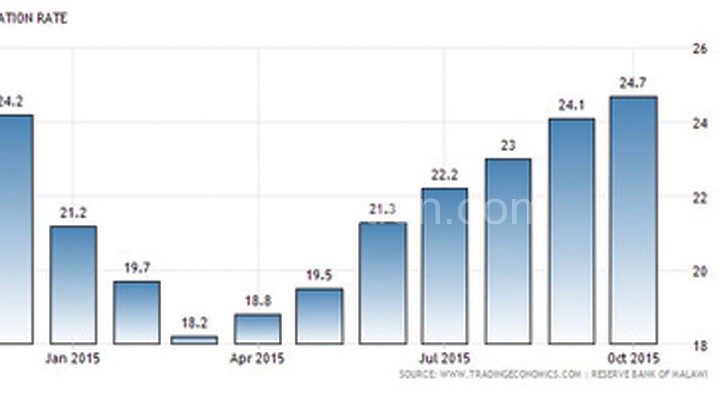Malawi to miss 2015 inflation target
The World Bank has forecast that Malawi will likely miss her 2015 average inflation target, estimating an average rate of 21.7 percent, way above government projected 16.4 percent.
The global multilateral lender has said this in its latest publication called the Malawi Economic Monitor titled Adjusting in Turbulent Times, which has provided an in depth analysis of economic and structural development issues in Malawi.
The 2015/16 budget was premised on a real gross domestic product (GDP) growth rate of 5.4 percent, an average inflation rate of 16.4 percent, and on an exchange rate of K450 to the dollar.
But the World Bank publication: “In terms of all three indicators, conditions are likely to be worse than expected, putting the authorities under considerable pressure.”
The assessment by the World Bank comes deep into probably one of Malawi’s worst economic situations which has rendered authorities at Capital Hill helpless and clueless as donors—who in the past contributed 40 percent to the national budget—continue to shun Malawi, irked by a massive plunder of public funds in November 2013 christened Cashgate.
“The rate of inflation seems set to continue in double digits, with this rate estimated by the World Bank to reach an average of 21.7 percent in 2015, the second highest in Africa,” says the publication.
Headline inflation rate for August 2015 stood at 23 percent, compared to 24.5 percent at the same period last year and 0.8 percentage points higher than the figure recorded in July 2015, according to the National Statistical Office (NSO).
In earlier months of the year, the country experienced a gradual easing of price pressures, driven by both falling imported energy prices and lower domestic food prices.
Adds the bank: “A higher rate of inflation will increase the cost of domestically procured goods and services and lead to increased wage bill demands from public servants. “
According to the bank, poor maize crop meant that the usual seasonal, post-harvest drop in prices was severely muted adding that as a result, food prices have risen steadily over recent months due to expectations of shortages.
Commenting on the reduction of the Liquidity Reserve Ratio (LRR), the bank says the move involved a reduction in the share of total capital that commercial banks need to leave on deposit at the Reserve Bank of Malawi (RBM) from 15.5 percent to 7.5 percent.
“This has released some K40 billion into the banking system. While the intention of the policy was to reduce the spread between deposit and lending rates, an indirect effect has been to exacerbate inflationary pressures and increase the demand for foreign currency,” the report reads.
While prime lending rates have declined, World Bank observes that the rates continue to be prohibitive for most borrowers, warning that the situation is likely to continue until core inflation is brought back under control.
The control of core inflation, the bank says is highly dependent on reducing the size of the fiscal deficit and on curbing Government’s appetite for borrowing. n






